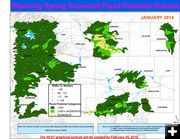Spring Snowmelt Flood Potential Outlook
Mountain snowpack in Wyoming generally above average for mid-January
by Jim Fahey, Wyoming NOAA hydrologist
January 24, 2014
Quick Synopsis:
Mountain snowpack and associated snow water equivalents (SWEs) across Wyoming were generally above average by the middle of January. SWEs at the peak snowmelt runoff elevations (8,000’ – 9.500’) were the highest across northeastern Wyoming at 120 to 145 percent of median; while across southwestern Wyoming, SWEs were 85 to 95 percent of median at the peak snowmelt runoff elevations.
This outlook is based on various diverse hydrological factors such as snow water equivalents (SWEs) in the mountain snowpack, basin morphology (i.e. how basins respond to snowmelt), extent of burn scars from 2012 and 2013 fires, amount of bark beetle kill, and likely temperature and precipitation trends during late spring/early summer.
HIGHLIGHTS:
Moderate potential for flooding associated with snowmelt is expected across various headwater streams along the Powder River Drainage as well as along eastern portions of the Big Horn Basin. Streams with the highest potential for flooding include the Middle Fork of the Powder River (Kaycee), Medicine Lodge Creek, Ten Sleep Creek (Ten Sleep), and Clear Creek (Buffalo).
Moderate potential for flooding associated with snowmelt is also expected along the Little Snake River near Baggs and along the Encampment River near Riverside.
All other of headwater basins across Wyoming can expect a generally low potential for flooding due to springtime snowmelt.
Other hydrological information for Wyoming can be found at the NOAA hydrology website:
Monthly Wyoming Hydrologic Summary and Graphics:
http://www.crh.noaa.gov/riw/?n=snowpack
(updated monthly around the 15th of every month)
|
